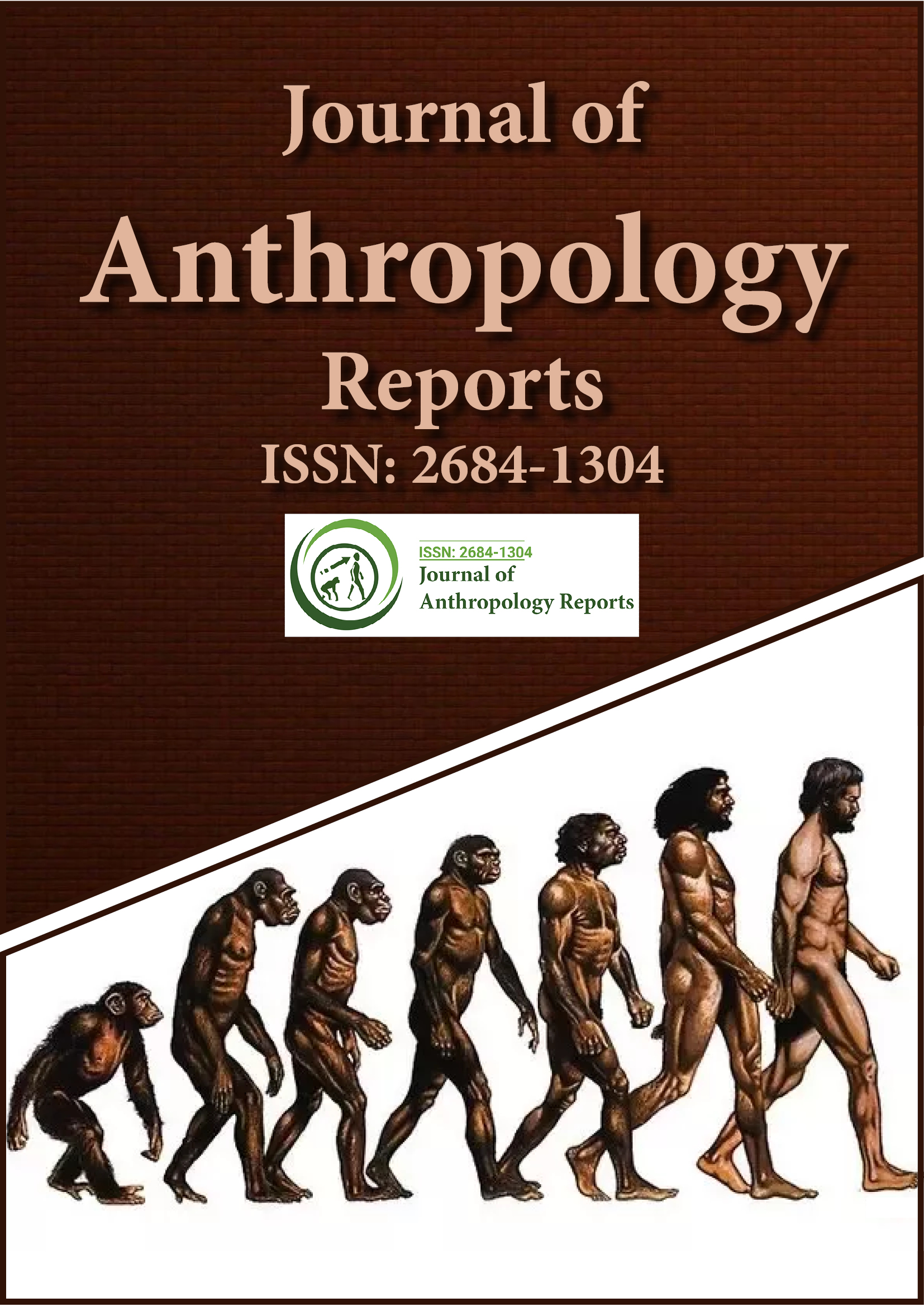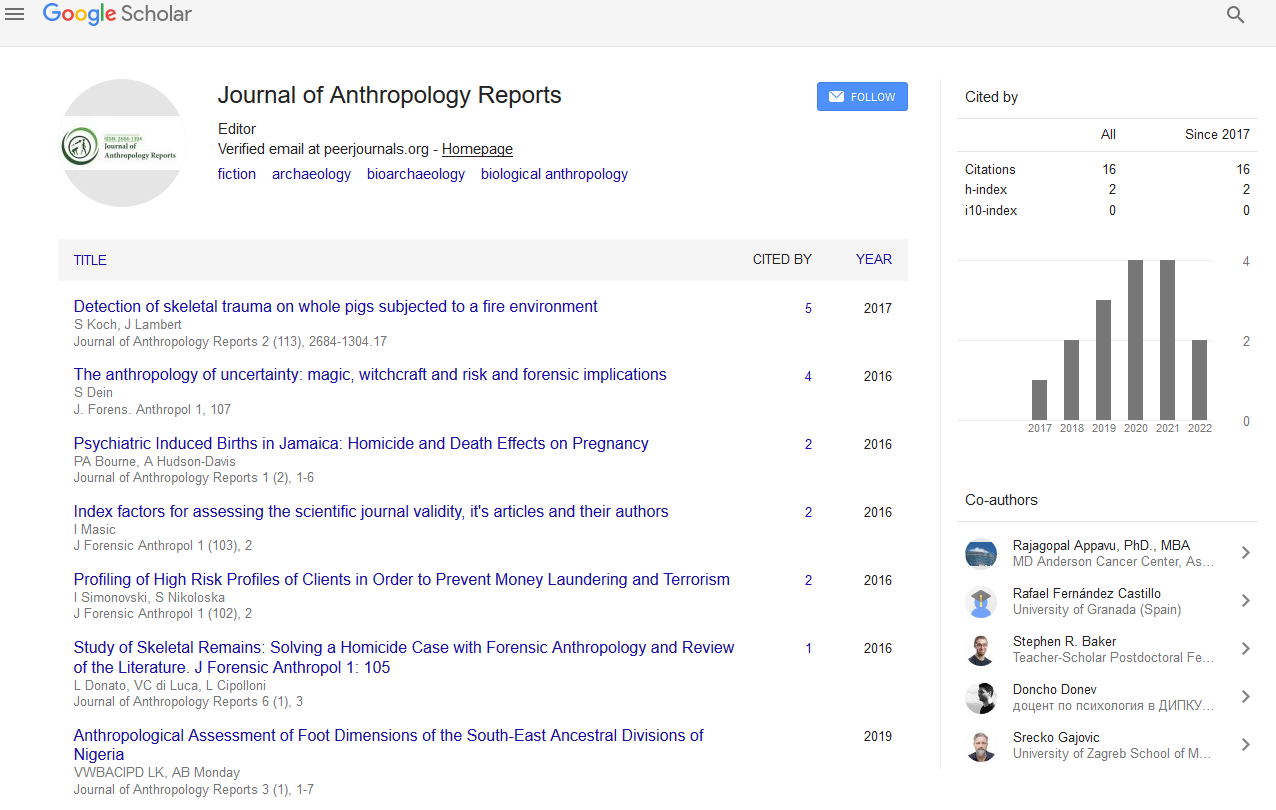Indexed In
- RefSeek
- Hamdard University
- EBSCO A-Z
Useful Links
Share This Page
Journal Flyer

Open Access Journals
- Agri and Aquaculture
- Biochemistry
- Bioinformatics & Systems Biology
- Business & Management
- Chemistry
- Clinical Sciences
- Engineering
- Food & Nutrition
- General Science
- Genetics & Molecular Biology
- Immunology & Microbiology
- Medical Sciences
- Neuroscience & Psychology
- Nursing & Health Care
- Pharmaceutical Sciences
Commentary - (2023) Volume 6, Issue 2
Impact of Nationalism on Anthropological Perspectives
Patricia Jana*Received: 19-Jun-2023, Manuscript No. JFA-23-21909; Editor assigned: 21-Jun-2023, Pre QC No. JFA-23-21909 (PQ); Reviewed: 05-Jul-2023, QC No. JFA-23-21909 (QC); Revised: 12-Jul-2023, Manuscript No. JFA-23-21909 (R); Published: 20-Jul-2023, DOI: 10.35248/2684-1304.23.6.158
Description
In the past, anthropologists tended to focus on isolated, small communities, which often gave the impression of ignoring larger phenomena like nationalism. However, the anthropological preference for marginality emphasizes and reaffirms the value of ethnographically grounded perspectives for critically evaluating the influence of the ideologically centralized nation-state on citizens' lives. The idea of a group of people who share a culture, often a language, sometimes a religion, and usually, but not always, a history is frequently invoked in the claim to nationhood. The political argument that this group of people ought to be ruled by people of the same kind-nation, ethnicity, language, religion, etc. In this way, the political doctrine of nationalism can be traced back to German Romantic philosophers like Herder and Fichte, whose ideas also played a significant role in the creation of the anthropological concept of culture.
Therefore, anthropology and nationalism share an intellectual history, and nationalism serves as a reminder of the political implications of common anthropological assumptions about the world, such as the notion that individuals can naturally be classified as belonging to distinct, bounded cultures or societies. Boas (who unequivocally recognized the impact of Herder) and his understudies, for instance, faced a long conflict against 'race' in the between war years, however in subbing rather culture they neglected to scrutinize the presumption that individuals normally had a place with one culture and one culture in particular.
As a matter of fact this supposition that is so broad in the cutting edge world that it has seldom been exposed to supported scholarly examination. While other types of collective categories, like class, were subjected to endless theoretical scrutiny, great social theorists like Weber and Marx frequently treated nationalism and the vision of human cultural difference on which it is based as a self-evident feature of the world. Nationalism was the great forgotten subject of the human sciences, despite its pervasive effects on twentieth-century world history, and their followers in sociology, history, and political science frequently followed suit. In a similar vein, anthropologists rarely questioned the concept of nationhood, preferring, in some instances, the less polarizing topic of ethnicity or even contributing to the creation of nationalist cultural stereotypes in other instances.
In general, anthropologists have been slower to address nationalism as a particular political phenomenon and its undeniable ability to mobilize people for political action in contemporary societies. Much ethnographic examination has rather focused on the ceremonies and images of patriotism, chasing after a line of enquiry opened up by Hobsbawm and Officer's development of custom. As in Verdery's important study of Romanian nationalism under Ceausescu and McDonald's work on Breton nationalism, intellectuals and cultural producers become unexpected subjects for anthropological investigation in this study. Handler's study of Quebecois nationalism "as a cultural system" evolved into a significant investigation of the intellectual genealogy of anthropological and nationalist ideas, particularly the concept of a "cultural system" that Handler had borrowed from David Schneider's symbolic anthropology. However, the outcome is troubling because Handler's argument is not only a critique of the anthropological concepts he applied to the study of Quebecois nationalism but also of that nationalism.
Most anthropologists are supposed to take a beneficent line on the profoundly held feelings of individuals they expound on, and it is unplanned to find a political and social peculiarity subject to such unremitting analysis. Politically this isn't a secret, as patriotism can be considered responsible for the majority of the gravest wrongdoings in the ridiculous 20th century. However, it ought to be more challenging intellectually. In the case of nothing else, it fills in as a healthy update that anthropologists can't, and shouldn't, utilize statements of relativism as a distraction to hide their own unavoidable political commitment with the subjects of their review.
Citation: Jana P (2023) Impact of Nationalism on Anthropological Perspectives. J Anthropol Rep. 6:158.
Copyright: © 2023 Jana P. This is an open-access article distributed under the terms of the Creative Commons Attribution License, which permits unrestricted use, distribution, and reproduction in any medium, provided the original author and source are credited.

